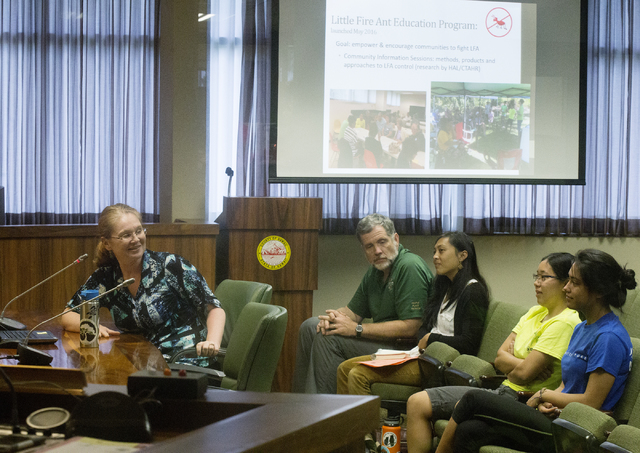With a county voucher program set to expire at the end of next month, Hawaii Island legislators once again are hoping to secure state funding that would help residents combat invasive little fire ants. ADVERTISING With a county voucher program
With a county voucher program set to expire at the end of next month, Hawaii Island legislators once again are hoping to secure state funding that would help residents combat invasive little fire ants.
All eight of the island’s representatives in the state House have signed on to House Bill 481, introduced by Rep. Richard Onishi, D-Hilo, Keaau, Kurtistown, Volcano. This marks the third year Onishi has introduced a version of the measure, which would create a pilot pesticide treatment program within the state Department of Agriculture.
The bill would provide coupons for a one-year treatment plan to people who have documented little fire ants on their property, appropriating $300,000 from Hawaii general revenues to do so.
At the same time, the DOA would create a map of all known infestation sites on Hawaii Island. One of the primary issues with containing the pests is that neighbors often do not know when there are fire ants on nearby property, which allows the ants to spread.
The bill cleared the House during the 2015 and 2016 sessions. Last year, it passed both chambers and made it to conferencing, but did not get funded.
More than 20 representatives have signed on to HB 481 this year.
“I think the Legislature is keenly aware that the Big Island’s little fire ant issue is not just affecting the residents and property (here), it has the potential for affecting the entire state,” Onishi told the Tribune-Herald on Thursday.
So far, HB 481 has cleared a joint committee hearing and is awaiting a hearing with the Finance committee. Its Senate companion bill, introduced by Sens. Lorraine Inouye and Josh Green, has yet to receive a hearing.
Hawaii County Council is at work on a resolution urging the Senate and House to support “any and all legislation related to the little fire ant program,” Councilwoman Sue Lee Loy said Tuesday during a meeting of the county Agriculture, Water and Energy Sustainability Committee.
Lee Loy submitted written testimony in support of the bill to its most recent hearings before the House Agriculture and Energy and Environmental Protection committees. HB 481 also received support from the Conservation Council for Hawaii, Hawaii Farm Bureau, Hawaii Pest Control Association and Democratic Party of Hawaii.
The DOA provided comments about the measure stating its concern that “it would be very difficult for the department, with its given resources, to verify and monitor if the pesticides were being used for the purpose of controlling (little fire ants) or for other purposes.”
The comments also pointed to a successful voucher program in use by Hawaii County. That program, funded by a grant from the Hawaii Invasive Species Council, began last November. As with HB 481, it offers vouchers to residents, who are required to attend a pesticide treatment training session hosted by the Big Island Invasive Species Committee or the Hawaii Ant Lab before receiving their coupons.
Because it is grant-funded, however, that program ends March 31. The training sessions themselves were funded in part by county contingency relief money.
Cost of treatment is one of the major barriers to effective ant control, BIISC communications director Franny Kinslow Brewer told the county agriculture committee on Tuesday.
“The county vouchers have gone a long way to being able to (address) that,” she said. “Cost is always, at every single meeting, something that community members say, ‘We need help with.’ Anything that can get more financial assistance, especially in lower Puna, (where) we have communities where people don’t have a lot of money.”
Onishi said the Legislature also was looking for more information about how successful the county voucher program was, to see if an alternative avenue would be continuing to fund it through grants, as opposed to “re-creating the wheel at the state level.”
The bill “still has a long way to go,” he said.
Email Ivy Ashe at iashe@hawaiitribune-herald.com.
There are three remaining BIISC training sessions planned: Feb. 25 (Keokea Park in North Kohala), March 4 (Hawaiian Paradise Park Community Center) and March 11 (Panaewa Park).
The Hawaii Ant Lab has two more sessions with space, March 11 and 15. Both will take place in the Aupuni Center Conference Room.
To RSVP for a little fire ant voucher training session, visit http://www.biisc.org/rsvpforlfatraining/ or http://www.hawaiicounty.gov/rd-agriculture.



